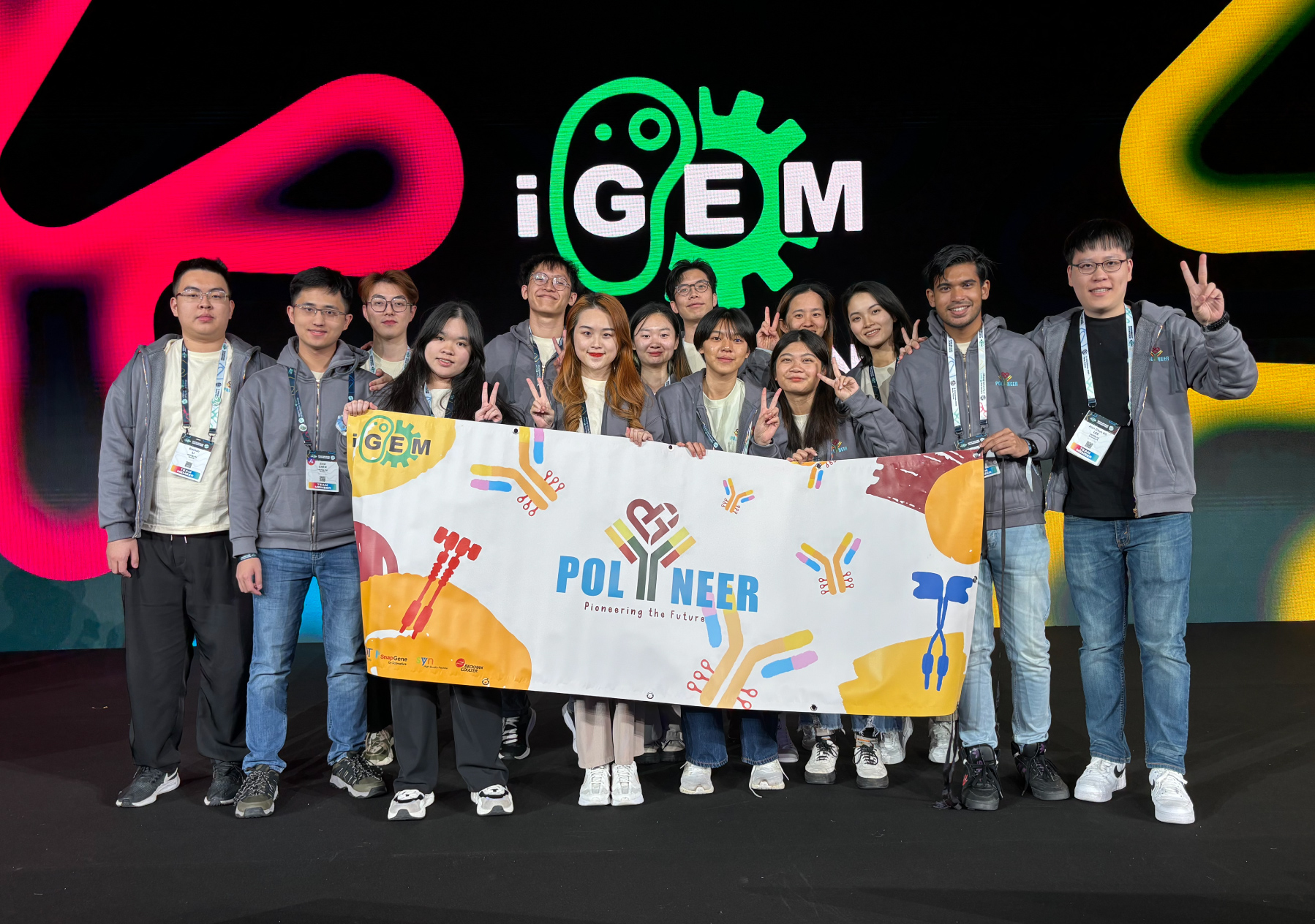The iGEM competition is a prestigious international event that draws over 400 teams from 60 countries annually, including renowned institutions. It is the most well-known Synthetic Biology competition for students, providing a platform for participants to pursue their passion for synthetic biology and share innovative ideas with other teams. The competition aims to develop an open community and enhance collaboration with other universities. The Polyneer team from PolyU joined iGEM for the first time, aiming to make a positive impact on the world by focusing on solving the issue of acquired resistance of non-small cell lung carcinoma to EGFR-targeted therapy. After nearly a year of hard work, the team was awarded a "silver medal" among the more than 400 teams, making their efforts worthwhile.

Mr. CHAN Tsz Hei Jacky, Ms. YANG Huizi Amber,
Ms. IP Lut Yi Louisa, Ms. LI Minxi Estella,
Mr. CHEN Zelei Evan, Mr. LI Bochao Dave,
Ms. LI Chiu Wing Winnie, Ms. LE Man Hei Tiffany,
Ms. CHOW Tsz Ching Valerie, Ms. QIN Shengjia Vivian,
Mr. CHEN Zihao Allen, Mr. ISHRAQ Hasin &
Mr. WONG Chak Sum Sam
Department of Applied Biology and Chemical Technology
Faculty of Science
Synthetic biology involves designing and constructing new biological parts, devices, and systems. The iGEM competition focuses on this field, encouraging students to develop innovative solutions using genetic engineering. PolYneer create "biobricks" (standardized DNA sequences) to construct biological systems that can perform specific functions.
PolYneer focused on non-small cell lung cancer (NSCLC), a subtype of lung cancer with a low survival rate. They aimed to address the issue of acquired resistance to EGFR-targeted therapy. This involved understanding the molecular mechanisms of cancer progression and resistance, as well as developing strategies to overcome these challenges.
The project involved the synthesis and validation of a novel bispecific antibody to target NSCLC. This required knowledge of genetic engineering techniques, protein expression, and purification processes. PolYneer had to design, construct, and test their biobrick, demonstrating their proficiency in biotechnology.
PolYneer used bioinformatics tools to draft their project proposal, gather inspiration from scientific literature, and analyze experimental data. They needed to interpret large datasets, perform sequence analysis, and validate their design at the cellular level, highlighting the importance of computational biology in modern research.
The iGEM competition emphasized collaboration within the community, including conferences, online forums, and partnerships with other teams. Effective communication was crucial for presenting their project, securing funding, and engaging with stakeholders. This experience underscored the importance of interdisciplinary teamwork and effective communication skills in scientific research.
The iGEM competition involved forming a diverse team of 13 members, including professors and students, from various backgrounds and expertise. This required effective communication and collaboration to ensure everyone was aligned and working towards common goals. Standardized meeting protocols, note-taking practices, and regular updates helped in overcoming communication challenges. Learning to work with people of different personalities, languages, and cultural norms was essential.
Managing a substantial workload within a limited timeframe while balancing academic responsibilities, personal lives, and iGEM project duties required rigorous project management strategies. Tasks were divided according to individual strengths and availability, ensuring an efficient workflow. Regular meetings helped track progress and troubleshoot issues promptly. Time management skills were sharpened as team members had to meet strict deadlines and ensure all tasks were completed on schedule.
PolYneer faced numerous challenges, including technical difficulties in synthesizing novel antibodies, acquiring new knowledge in unfamiliar areas, and securing dedicated space for experiments. Problem-solving skills were honed by seeking guidance from supervisors, conducting extensive research, and adapting project elements based on findings. The ability to quickly learn new skills, such as video editing and web page design, was crucial for project success.
Engaging with various stakeholders, including cancer experts, other iGEM teams, and the general public, was a key aspect of the project. PolYneer conducted fundraising campaigns, participated in entrepreneurship and innovation challenges, and reached out to experts for feedback and collaboration. Networking skills were enhanced through these interactions, which involved effective communication, building relationships, and leveraging external resources to support the project.
The pursuit of knowledge is a lifelong journey! To further expand your knowledge and continue your personal and professional growth. Click and explore the following learning resources:
Biotechnology and Genetic Engineering
Bioinformatics and Data Analysis
Interdisciplinary Collaboration and Communication
Communication and Presentation Skills
Project Management and Teamwork